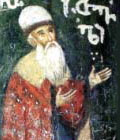Tamar Sharabidze # 8
Motif of Moral Obligation and Leaving a Trace in Ilia Chavchavadze’s Creations
In creative life of every great poet there comes a point of seeking the truth which is understood differently by each creator. General principles can coincide but a talented writer has personal unique vision and it is expressed in such words that are perceived only as his own.
The problem of seeking the truth, which is based on Christian values, is the central one in Ilia Chavchavadze’s creative works. According to the well-known lyrical verses, the poet’s thoughts proceed in this way: an adolescent stands close to the Lord God but, as time goes by, along with passing between childhood and maturity, he becomes estranged from God and thus deserted because the bond with God set up by an adolescent’s innocence, honesty, thoughts, and dreams has been lost (To The Kvareli Mountains). The Kvareli Mountains looked at through the eyes of an adolescent could be associated with a medium bound with the Heavens connecting the earth and sky. Adults, whose mind is already captured with the thoughts about transient world, become incapable of perceiving divinity and seek the other ways.
We can distinguish several paths in Illia’s creations: 1. An aspiration to self-perfection which is realized by imitating the Lord God Rodemdis (“How Long?”); 2.Path of moral obligation and leaving a trace (To The Kvareli Mountains, To a Georgian Mother, Even if I Die.); 3. Poetic process (The Bird, The Heaven Voices, The Poet,); 4.Sadness (Sadness); 5. Orphanage (Spring); 6.Prayer (To G.Abkhaz, Lord Father, Odes Demon); 7.Love (Love; What do I love you for?, I had Good Estate sometime).
Of all these paths of seeking the truth, Ilia’s personality and character is most of all revealed in the path moral obligation and leaving a trace. It is because of moral obligation that Ilia is straying from the Kvareli Mountains. The reason of his alienation is that it is hard for the poet to stand his own “nothingness” (I suffered much, ("ბევრი ვიტანჯე"); he does not wish his lyre to play in vain And even if I die ("დაე, თუნდ მოვკვდე") and the poet will know no rest until his much suffered nation is free and happy (The Poet). The analysis of Ilia’s creative works vividly shows that leaving a trace is the same as aspiration to self-perfection, the only path to approach God. Ilia’s attitude to those who do not live in accordance with the word of God was negative. Being formed from “the dust” he expresses himself as ‘the dust’ again, but life, this “immortal gift” is a companion of the dust (How Long?) ("როდემდის"); according to the poet “celestial gift” is “an active soul” which is as infinite as “the one who breathed new life” (refers to immaterial nature of “infinite “ soul and “the one who gave breath to new life” must be understood as artistic image of God. Taken as a whole Ilia Cahchavade’s creative works express the idea of how man should fulfill his moral obligations so as to leave a bright trace behind.
In spite of the fact that the 19th century, especially the sixties was marked by differentiation and integration of consciousness which provided development of thinking, from the religious viewpoint the creative works of Georgian classics not only became distant from religious tenets but, on the contrary, with all depth they expressed an adherence to follow the path of our ancestors. As to the artistic thinking, each creator managed to express himself in a free and individual way. Their individualism is easily seen even in putting forward the question. In our view, Ilia Chahvchavadze’s creative works represent bright manifestation of personal strength, firmness and faith, one example of which is the motif of “moral obligation and leaving a trace”.
Bibliography:
Bakradze 1984 : Bakradze A. Ilia Chavchavadze. Tbilisi. “Merani” publishing -house, 1984.
Kveselava 1961 : Kveselava M. Faustian Paradigms. Tbilisi “Sabchota Sakartvelo”, 1961.
Chavchavadze 1987 : Chavchavadze I. The 20-volume complete collection of works, v.,I. Tbilisi. Publishing –houses “Metsniereba” and “Sabchota Sakartvelo”, 1987.
 |

